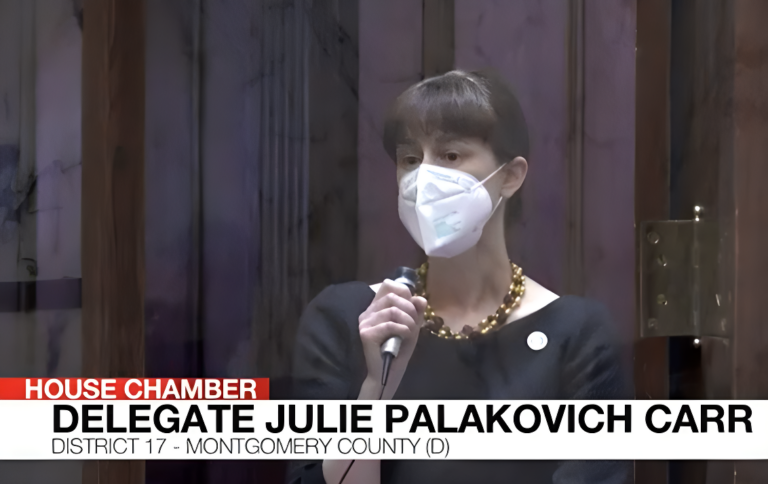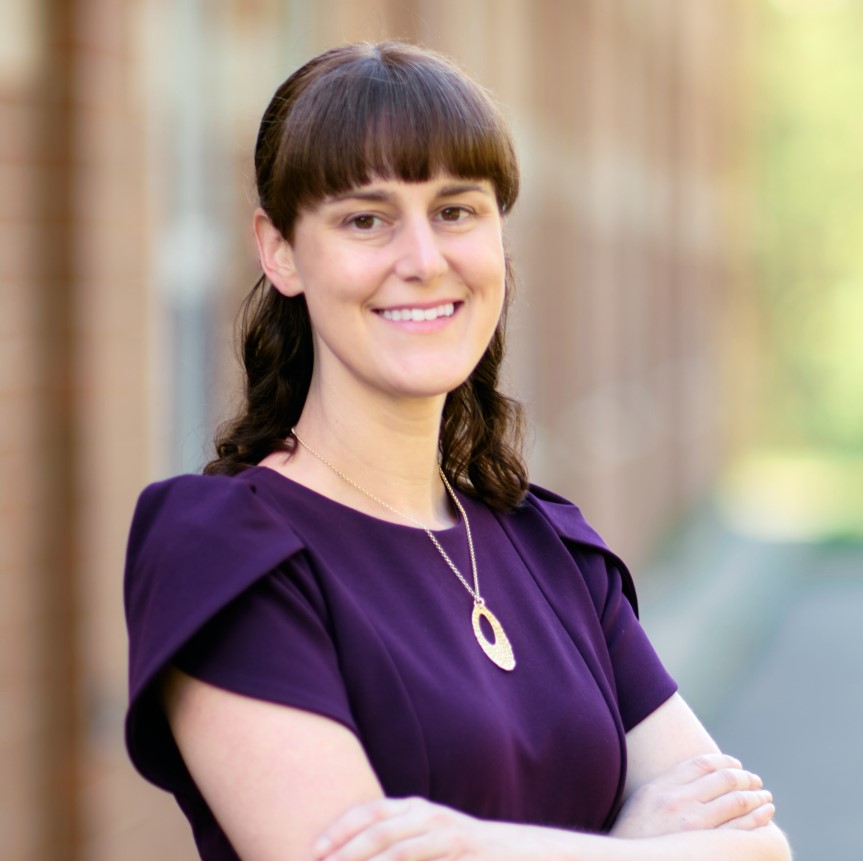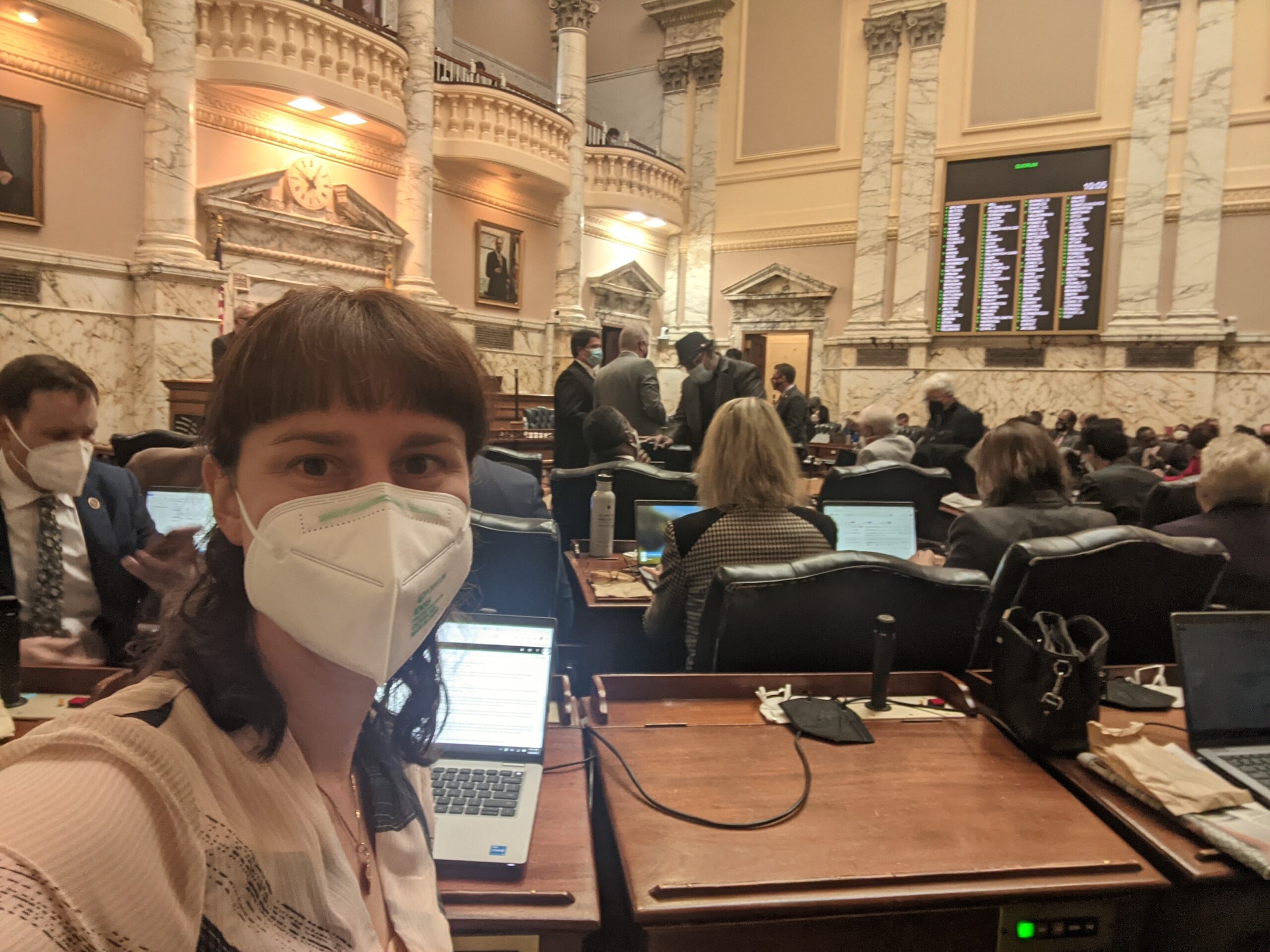
Julie Palakovich Carr is the only biologist with an advanced degree in the Maryland General Assembly, where she has been a representative since 2019. She talked with ESAL about the high-impact role of an elected official and the advantages that a scientific background affords policy makers.
EL: What led you to science and public service, and what keeps you there?
Palakovich Carr: Both of my parents were public workers: my mom in education and my dad in the Department of Corrections. They instilled in me the need to give back. When I was younger, I was confident that I would be an MD, but those plans changed when I realized I could pursue a career in research. By the time I finished my master’s, I didn’t see doing science day in and day out as the right fit for me anymore and wanted to explore policy-making.

The NOAA Knauss Fellowship was the perfect next step. Working on Capitol Hill in a senator’s office solidified the exciting nature of policy work. I then went to work for the American Institute of Biological Sciences for nine years, training scientists to effectively communicate their research with the press and advocating for investments in science. I enjoyed it, but I still wanted to be more involved politically and eventually run for office – and I did just that. I was elected to the City Council in Rockville, Maryland in 2013. Then, after more than five years, made it to the state house. I’m hoping to stay in the legislature for a while, since I enjoy being a state delegate. It’s a very rewarding position, where I can see the impact of my work on people’s lives.
EL: What does your background in science bring to your position that would have been otherwise difficult to obtain?
Palakovich Carr: One of the superpowers to being a trained scientist is having an analytical mind. This is a useful and transferable skill to lawmaking, since we are frequently dealing with topics outside of our areas of expertise. I find it helpful to be able to dig into peer-reviewed literature and primary data when trying to evaluate if a particular policy will have the desired impact. There have been times when I find evidence of other policymakers having tried to enact certain policies that are of interest to Maryland, and so we can look at the outcomes in other states to help us make a more informed decision. For instance, when an extension to a particular state tax credit was proposed, I dived into state data to figure out how the money was being allocated across the state. From this analysis, I realized that the existing credit wasn’t doing what it was intended to do, which was to help low income communities. When I shared my findings with my colleagues, some were surprised at my ability to undertake such an analysis independently, despite relying solely on publicly available information.
EL: What are some things people might not know about being an elected official?
Palakovich Carr: Thankfully, the Maryland General Assembly is not as divisive as Congress. Yes, there are partisan politics, but lots of bills pass unanimously or with bipartisan support. It’s a collegial atmosphere, and members of opposite parties have friendly, courteous, and professional relationships.
We work on an annual cycle and are in session January through April. The early summer and fall is when we do most of our research to vet potential bills and to figure out how to tackle problems through legislation. I love exploring options and digging into reports to figure out what might be a viable bill. I keep a running spreadsheet of potential bill ideas – we typically consider about 50 ideas each year, and we will introduce 15-20 of those as bills. I tend to sponsor more bills than other Delegates, who usually introduce 5-10 bills.
One thing that still surprises me about being in state office versus local office is that I hear from fewer residents. Despite representing more constituents, I get fewer emails in the House than I did on the city council. That said, people should never hesitate to reach out. We are here to help!
EL: Please tell us about one of your proudest achievements in your current role.

Palakovich Carr: One of my proudest achievements is creating the Maryland Child Tax Credit to help very low-income families in my state.
There is robust evidence that targeted financial support to low-income families is a very effective way to lift children out of poverty and to improve their short-term and long-term outcomes in terms of health, education, and economic stability. That’s why several states have created state-level child tax credits. (People might be families with these types of credits due to the federal expansion of the federal tax credit during the pandemic.) So four years ago, I started working to establish a Maryland Child Tax Credit. I had been working with external groups to figure out how to make it affordable for the state while maximizing the impact for low-income families with kids. But the cost was a huge barrier. To be honest, the first year I introduced the bill, I felt so let down when the bill hearing ended, because I knew the bill wouldn’t move forward, since it would have cost tens of millions of dollars.
The following year, I put the bill back in and it ended up being a vehicle for another policy to extend aid to immigrants that were left out of other pandemic relief efforts. Although the child tax credit was significantly narrowed, we did manage to get the credit established in 2021. But my goal was always to help more families. When thinking about how to expand the credit, I reached out to the incoming Maryland governor’s team and talked to them. Governor Wes Moore has set a goal of ending childhood poverty in Maryland and the incoming administration saw this as an opportunity to act. We passed a bill this session that was requested by Governor Moore that helps an additional 40,000 families, each of whom receive a $500 credit per child each year to help with expenses like diapers, child care, and other necessities.
EL: What advice do you have for scientists interested in running for public office?
Palakovich Carr: To be successful on the political path, you have to want it enough to put in the time and effort. It consumes a lot of your life, especially when there’s an election. Running for and serving in office can also be disruptive to your personal life. People faced with that prospect have to be certain they want it enough.
If you’re not sure, ask yourself this question: Which would I regret more, running and not winning, or not running at all? I’ve run for public office four times now and won all four elections. If you might be interested, think seriously about whether it makes sense for you. For a lot of people who run, it’s their first time, and a lot of people who don’t win the first time go on to run a second time.
There are also less political paths, such as working for elected officials or in government or for an advocacy organization. I’d say that these are good options for anyone who has a passion for science but not for day to day lab activities or fieldwork. There are a range of science policy positions, some more or less political, such as working for non-profits or acting as an policy advisor. In Maryland, Johns Hopkins University offers the Bloomberg Fellows Program through their Master’s in Public Health program, in which students can work in places like the General Assembly.
In many places, there are local advisory groups that are part of local government and focus on a specific issue like watershed sustainability, public health, or environmental restoration. These groups are frequently starved for volunteers. The time commitment can be as little as one meeting per month - just a handful of hours of service, but it’s a great way to speak up for issues that are important to you!
You can find additional information on Julie Palakovich Carr on X, Facebook, and Instagram.
Do you have a story to tell about your own local engagement or of someone you know? Please submit your idea here , and we will help you develop and share your story for our series.